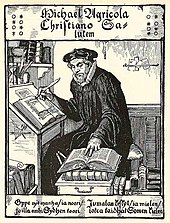Mikael Agricola
| Mikael Agricola | |
|---|---|

Mikael Agricola
|
|
| Born |
c. 1510 Torsby, Pernå, Uusimaa (Nyland), Sweden, Kalmar Union (now Finland) |
| Died | 9 April 1557 Uusikirkko, Carelia |
Mikael Agricola (Finnish pronunciation: [ˈmikɑel ˈɑɡrikolɑ] ![]() pronunciation ) (c. 1510 – 9 April 1557) was a clergyman who became the de facto founder of literary Finnish and a prominent proponent of the Protestant Reformation in Sweden, including Finland, which was a Swedish territory at the time. He is often called the "father of literary Finnish".
pronunciation ) (c. 1510 – 9 April 1557) was a clergyman who became the de facto founder of literary Finnish and a prominent proponent of the Protestant Reformation in Sweden, including Finland, which was a Swedish territory at the time. He is often called the "father of literary Finnish".
Agricola was consecrated as the bishop of Turku (Åbo) in 1554, without papal approval. As a result, he began a reform of the Finnish church (then a part of the Church of Sweden) along Lutheran lines. He translated the New Testament into Finnish and also produced the prayer book and hymns used in Finland's new Lutheran Church. This work set the rules of orthography that are the basis of modern Finnish spelling. His thorough work is particularly remarkable in that he accomplished it in only three years.
He died suddenly while returning from a trip during which he negotiated a treaty with the Russians.
Michael Olaui or Mikkel Olofsson (Finnish Mikael Olavinpoika) was born in Nyland (Uusimaa) in the village of Torsby in Pernå (Pernaja), Sweden (now Finland), around the year 1510. He was named after the patron saint of Pernå's church. The exact date of his birth, like most details of his life, is unknown. His family was a quite wealthy peasant family according to the local bailiff's accounting. He had three sisters, but their names are not known. His teachers apparently recognized his aptitude for languages and his rector Bartholomeus sent him to Viborg (Fi. Viipuri; now Vyborg, Russia) for Latin school and some priestly training, where he attended the school of Erasmus. It is not known whether his first language was Swedish or Finnish; the first alternative is supported by the fact that Pernå was mostly a Swedish-speaking district. However, he mastered both languages like a native speaker and was possibly a bilingual child.
...
Wikipedia
